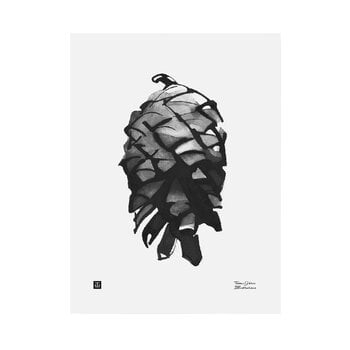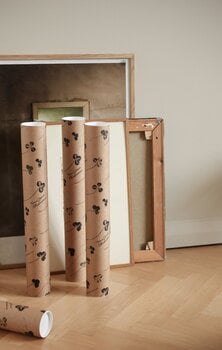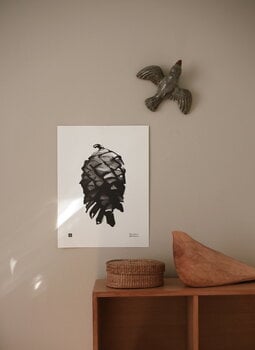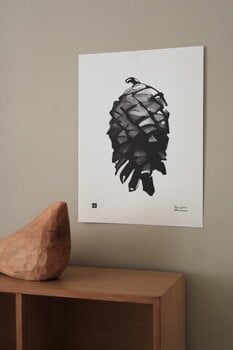Teemu Järvi’s Pine Cone poster adds a touch of tranquility and the calm atmosphere of Northern forests to your wall. The poster is offset printed in Finland on 150 g uncoated off-white paper. Finish the organic appearance of the poster with Teemu Järvi's wooden poster frame which is sold separately; this poster is perfect for the 30 cm frame.
Pine Cone poster, 30 x 40 cm
Teemu Järvi Illustrations
Description
Teemu Järvi’s Pine Cone poster adds a touch of tranquility and the calm atmosphere of Northern forests to your wall. The poster is offset printed in Finland on 150 g uncoated off-white paper. Finish the organic appearance of the poster with Teemu Järvi's wooden poster frame which is sold separately; this poster is perfect for the 30 cm frame.
Product details (5)
- Material
- Offset printed on 150 g uncoated off-white paper. Archival quality, FSC certified.
- Colour
- Off-white, black
- Width
- 30 cm
- Height
- 40 cm
- Notes
- Frame sold separately.
- Product ID
Designer
Teemu Järvi (born 1973) studied art in the Free Art School in Helsinki and received his Master of Arts degree in Spatial and Furniture Design from University of Art and Design Helsinki. He has become known for his work in the Järvi & Ruoho design office and the Vera chair, which Wallpaper Magazine selected as the most beautiful chair of the year in 2004. His work and illustrations have appeared in a number of international publications including International Design Year Book, Interni and Abitare.
Teemu Järvi has gained recognition in various design competitions (incl. Pro Finnish Design 2001, Caiazza Memorial Challenge 2003, and Vuoden Huiput 2013), won Carin and Erik Bryggman Award (2007) and received grants from the Finnish Cultural Foundation (2004-2009). In 2004, Wallpaper Magazine named Järvi as one of the 15 Most Wanted Designers in the Future.
View all productsReviews (0)
Sustainability
The Product Sustainability Framework, our criteria of sustainable design, helps you find the most sustainable products in our selection. Read below which sustainability criteria this product has met.
Working conditions & labour 7/9
-
Equal opportunities for all employees
-
Commitment to UN Global Compact, fair compensation for all employees
-
Corporate responsibility requirements defined and communicated for suppliers
-
Systematic work for improved inclusion and well-being in the workplace
-
Transparent supply chain
-
Suppliers' compliance to a code of conduct ensured
-
Compliance to the UN Guiding Principles on Business and Human Rights ensured in the supply chain
-
Direct suppliers audited and certified
-
Support for community involvement in the supply chain
Eco-friendly production 9/9
-
Fair and resource-wise water-use in production
-
No incineration or landfilling of returned items
-
No use of endangered species as materials
-
No direct environmental emissions or waste (excl. GHGs) from production
-
The sustainability of direct suppliers' production is addressed and monitored
-
Production and material sourcing that respect biodiversity, animal rights, and natural ecosystems
-
Material-efficient and ecological packaging
-
Positive impact on nature’s well-being through operations that regenerate natural ecosystems
-
No potentially harmful chemicals used in own production
Climate impact 3/8
-
Company's direct greenhouse gas emissions identified and commitment to reduction
-
Product's carbon impact identified and commitment to reduction
-
Guidance on energy- and eco-efficient use of the product
-
Contribution to climate initiatives beyond the brand’s direct operations
-
Low-carbon or compensated transportation
-
Carbon footprint of the product calculated and goals set to reduce it
-
100 % renewable energy in own production and operations
-
Carbon neutral or carbon negative product
Sustainable materials 6/6
-
Sustainable and long-lasting material choices
-
No harmful or hazardous substances
-
Responsible raw material sourcing and production
-
Materials suited for circularity: monomaterials, recyclable finishings, renewable or recycled contents etc.
-
Ecological materials: natural, biodegradable, recyclable or recycled contents
-
Outstanding materials in terms of innovativeness, responsibility, sustainability and circularity: local production or sourcing, 100 % recycled content, C2C-certification etc.
Circular design 4/5
-
High aesthetic quality promoting long-term use of the product
-
Technically durable product design and material choices
-
Design for enduring life-long quality
-
Design and support for product maintenance, repair and upgradability
-
Innovative circular design solutions: circular service system, resale platform, remanufacturing, collection of used products, etc.













